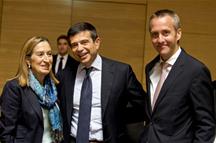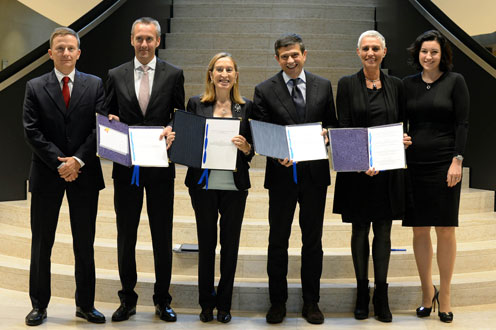At the Council meeting of European Transport Ministers in Luxembourg
Spain signs agreement to set up Atlantic Corridor Executive Committee with Portugal, France and Germany
News - 2014.10.8
The Minister for Public Works, Ana Pastor, signed an agreement to set up the Atlantic Corridor Executive Committee on Wednesday, together with her counterparts from Portugal, France and Germany, on the sidelines of the Council meeting of EU Transport Ministers.
Ana Pastor expressed "Spain's satisfaction" at being one of the co-signatories to this agreement to set up the Atlantic Corridor Executive Committee, since this is "one more step in the right direction being taken by European Union Member States".
This agreement will enable "the Atlantic Corridor in our country to be boosted", which will mean "many more opportunities for Spain, for goods transportation in the Iberian Peninsula and in the rest of Europe", pointed out Ana Pastor, who recalled that "by all working together", railway transport will have a more competitive future.
This committee will be responsible, among other things, for the definition of the general objectives of the corridor, will ensure that deadlines are met and, if necessary, request European funding in order for the implementation of the corridor to be carried out on time and in condition.
De-regulation of Spanish railway sector, a model for Europe
The first political debate on the Fourth European Railway Package took place at the Council meeting, which includes opening up the internal passenger market and the organisational system for companies that manage infrastructures.
Ana Pastor recalled that Spain has always advocated a European railway space, and in this context commented that "we must head towards a common regulation for all Member States because by having clear and common rules, we will increase competitiveness and offer greater opportunities under equal conditions for all our companies".
 Ministerio de FomentoThe Minister for Public Works pointed out that "Spain has an absolutely transparent and clear system, and this is the model we advocate for the whole of Europe".
Ministerio de FomentoThe Minister for Public Works pointed out that "Spain has an absolutely transparent and clear system, and this is the model we advocate for the whole of Europe".
In her speech, Ana Pastor highlighted that Spain has already started de-regulating the passenger railway sector via an ordered and progressive process, and advocated that at an EU-wide level there should also be a gradual, fair, reciprocal and transparent opening up of the railway market that results in the creation of a true Single European Railway Space.
A proportional European regulation for drones
This Council meeting also tackled, for the first time, a political debate on the need for European legislation on the use of remote controlled unmanned aircraft - so-called 'drones' - an idea which all the Member States expressed agreement on.
The Minister for Public Works recalled that Spain has legislation that regulates the civilian use of these aircraft and advocated that European legislation should also maintain proportionality between technical requirements and operational risks, whilst guaranteeing respect for the privacy and security of individuals.
Ana Pastor highlighted that Spain is committed to developing the drone sector, an emerging sector which, according to Brussels, will account for 10% of aeronautical commerce within a decade. But this growth, she pointed out, must take place without compromising security and to that end it is necessary to implement it gradually according to technological developments that guarantee security.
Spain wants more ambitious port regulation
At Wednesday's Council meeting, the first reading of the Regulation on Port Services took place, which seeks to harmonise conditions of access to port services throughout all ports in Europe, upon which consensus was reached.
In this regard, the Minister for Public Works recalled that Spain supports the establishment of a European legal framework that guarantees the provision of more efficient, quality services once this exists in Spain.
However, Ana Pastor pointed out that although Spain has accepted the proposal in the interests of compromise as a first step in the development of common legislation, "we would have liked this to have been somewhat more ambitious, such as the legislation in force in Spain" and for it to include passenger and goods services.





